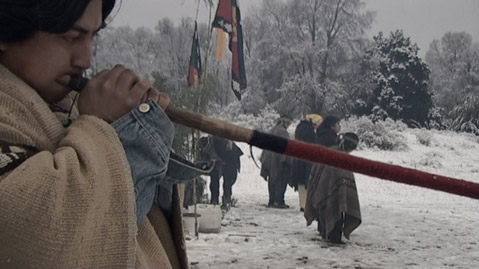SBIFF ’09: Latino
Cinemedia Sidebar
A Rundown of the Latin Films, Curated by Cristina Venegas

The Latino Cinemedia Film Festival was launched in 2004 by UCSB professor Cristina Venegas and filmmaker Osiris Casta±eda as a means of introducing Santa Barbara to Latino cinema and to nurture a budding group of young, Latino filmmakers through a year-long workshop. Although Cinemedia joined forces with SBIFF in 2005, the goals of the festival remain intact. Explained Venegas, “When we launched Cinemedia in 2004, a very structurally central portion of it was the Youth Cinemedia Project, and Osiris still works with that aspect of it today.” That project’s 18 short films will have their own special screening, as will the series of four short films from Mexico, Spain, and Canada, which is representative of the focus on indigenous cultures that go beyond Latin America.
And in trying to attract a broader audience during Cinemedia’s SBIFF partnership, each year, Venegas conjures a diverse mix of feature films. “There’s the same kind of mixture in the styles in the features and in the docs,” she explained of 2009. “There are more experimental pieces, and then there are more commercial features.” Another goal has been to increase the Latino interest in the festival. “As the years have gone by, we’ve been able to get a little bit more of the Latino community coming to the festival,” she explained.
Of the 16 feature films in this year’s sidebar, Venegas highly recommends three, including Amar a Morir, which will have its world premiere in Santa Barbara. A Mexican and Colombian co-production, the film follows the spoiled son of a Mexico City business magnate whose attempt to escape an arranged marriage results in tragedy. In opting to deal with the situation himself, he finds true love. She also recommends Eugenio Polgovsky’s Los Herederos (The Inheritors), an austere documentary from Mexico that depicts the lives of children who work as cattle herders, wood choppers, and brick makers as well as caring for their siblings. Despite their perseverance, poverty is all they seem to know. Lastly, Venegas sings the praises of Ishtar Yasin Gutierrez’s El Camino, a portrayal of a sister and her mute younger brother who live a destitute life in Nicaragua. The two leave their abusive grandfather and embark on a journey to Costa Rica, where they believe they will find a better life.
Other features include: Arr¡ncame La Vida (Tear This Heart Out), Mexico’s entry for the Oscar about a general, a woman, and a composer during the Mexican Revolution; Before Tomorrow, a Canadian film about indigenous survival on the arctic tundra; Los Demonios del Eden, a documentary about the Mexican journalist Lydia Cacho and her plight to reveal a pornography and prostitution ring run by a wealth businessman; La Naci³n Mapuce, about the plight of the Mapuce people of Argentina, whose land has been handed to transnational organizations; Oso Blanco, a documentary that uses animation to depict the inhumane treatment of prisoners in Puerto Rico’s most notorious prison; Our Disappeared, about an Argentine who travels back home to trace the fates of friends killed during the “Dirty War”; and Tit³n, de la Habana a Guantanamera, about the life of Cuban film genius Tom¡s Gutierrez Alea.



